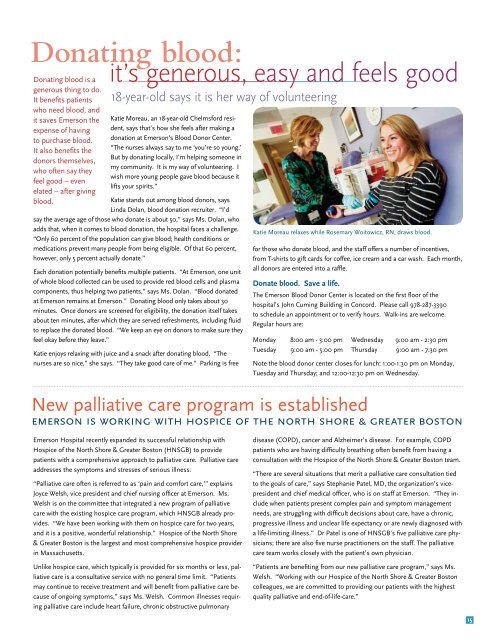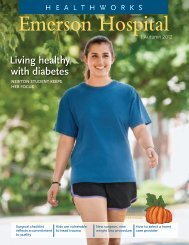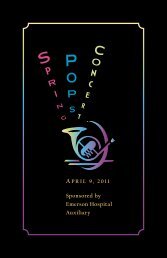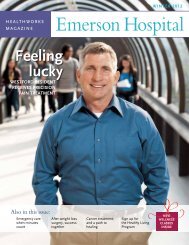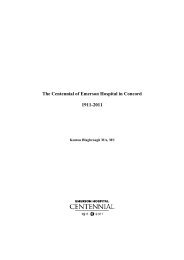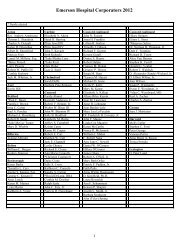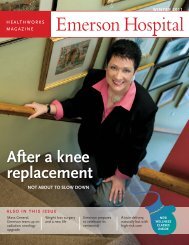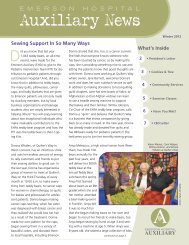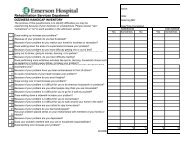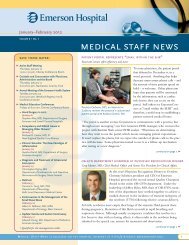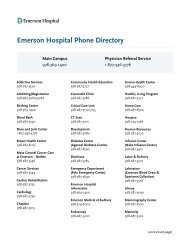Download PDF - Emerson Hospital
Download PDF - Emerson Hospital
Download PDF - Emerson Hospital
You also want an ePaper? Increase the reach of your titles
YUMPU automatically turns print PDFs into web optimized ePapers that Google loves.
Donating blood:<br />
Donating blood is a<br />
generous thing to do.<br />
It benefits patients<br />
who need blood, and<br />
it saves <strong>Emerson</strong> the<br />
expense of having<br />
to purchase blood.<br />
It also benefits the<br />
donors themselves,<br />
who often say they<br />
feel good – even<br />
elated – after giving<br />
blood.<br />
it’s generous, easy and feels good<br />
18-year-old says it is her way of volunteering<br />
Katie Moreau, an 18-year-old Chelmsford resident,<br />
says that’s how she feels after making a<br />
donation at <strong>Emerson</strong>’s Blood Donor Center.<br />
“The nurses always say to me ‘you’re so young.’<br />
But by donating locally, I’m helping someone in<br />
my community. It is my way of volunteering. I<br />
wish more young people gave blood because it<br />
lifts your spirits.”<br />
Katie stands out among blood donors, says<br />
Linda Dolan, blood donation recruiter. “I’d<br />
say the average age of those who donate is about 50,” says Ms. Dolan, who<br />
adds that, when it comes to blood donation, the hospital faces a challenge.<br />
“Only 60 percent of the population can give blood; health conditions or<br />
medications prevent many people from being eligible. Of that 60 percent,<br />
however, only 5 percent actually donate.”<br />
Each donation potentially benefits multiple patients. “At <strong>Emerson</strong>, one unit<br />
of whole blood collected can be used to provide red blood cells and plasma<br />
components, thus helping two patients,” says Ms. Dolan. “Blood donated<br />
at <strong>Emerson</strong> remains at <strong>Emerson</strong>.” Donating blood only takes about 30<br />
minutes. Once donors are screened for eligibility, the donation itself takes<br />
about ten minutes, after which they are served refreshments, including fluid<br />
to replace the donated blood. “We keep an eye on donors to make sure they<br />
feel okay before they leave.”<br />
Katie enjoys relaxing with juice and a snack after donating blood. “The<br />
nurses are so nice,” she says. “They take good care of me.” Parking is free<br />
Katie Moreau relaxes while Rosemary Woitowicz, RN, draws blood.<br />
for those who donate blood, and the staff offers a number of incentives,<br />
from T-shirts to gift cards for coffee, ice cream and a car wash. Each month,<br />
all donors are entered into a raffle.<br />
Donate blood. Save a life.<br />
The <strong>Emerson</strong> Blood Donor Center is located on the first floor of the<br />
hospital’s John Cuming Building in Concord. Please call 978-287-3390<br />
to schedule an appointment or to verify hours. Walk-ins are welcome.<br />
Regular hours are:<br />
Monday 8:00 am - 3:00 pm Wednesday 9:00 am - 2:30 pm<br />
Tuesday 9:00 am - 5:00 pm Thursday 9:00 am - 7:30 pm<br />
Note the blood donor center closes for lunch: 1:00-1:30 pm on Monday,<br />
Tuesday and Thursday; and 12:00-12:30 pm on Wednesday.<br />
New palliative care program is established<br />
emerson is working with hospice of the north shore & greater boston<br />
<strong>Emerson</strong> <strong>Hospital</strong> recently expanded its successful relationship with<br />
Hospice of the North Shore & Greater Boston (HNSGB) to provide<br />
patients with a comprehensive approach to palliative care. Palliative care<br />
addresses the symptoms and stresses of serious illness.<br />
“Palliative care often is referred to as ‘pain and comfort care,’” explains<br />
Joyce Welsh, vice president and chief nursing officer at <strong>Emerson</strong>. Ms.<br />
Welsh is on the committee that integrated a new program of palliative<br />
care with the existing hospice care program, which HNSGB already provides.<br />
“We have been working with them on hospice care for two years,<br />
and it is a positive, wonderful relationship.” Hospice of the North Shore<br />
& Greater Boston is the largest and most comprehensive hospice provider<br />
in Massachusetts.<br />
Unlike hospice care, which typically is provided for six months or less, palliative<br />
care is a consultative service with no general time limit. “Patients<br />
may continue to receive treatment and will benefit from palliative care because<br />
of ongoing symptoms,” says Ms. Welsh. Common illnesses requiring<br />
palliative care include heart failure, chronic obstructive pulmonary<br />
disease (COPD), cancer and Alzheimer’s disease. For example, COPD<br />
patients who are having difficulty breathing often benefit from having a<br />
consultation with the Hospice of the North Shore & Greater Boston team.<br />
“There are several situations that merit a palliative care consultation tied<br />
to the goals of care,” says Stephanie Patel, MD, the organization’s vicepresident<br />
and chief medical officer, who is on staff at <strong>Emerson</strong>. “They include<br />
when patients present complex pain and symptom management<br />
needs, are struggling with difficult decisions about care, have a chronic,<br />
progressive illness and unclear life expectancy or are newly diagnosed with<br />
a life-limiting illness.” Dr Patel is one of HNSGB’s five palliative care physicians;<br />
there are also five nurse practitioners on the staff. The palliative<br />
care team works closely with the patient’s own physician.<br />
“Patients are benefiting from our new palliative care program,” says Ms.<br />
Welsh. “Working with our Hospice of the North Shore & Greater Boston<br />
colleagues, we are committed to providing our patients with the highest<br />
quality palliative and end-of-life-care.”<br />
15


